The report from BWS is as follows:
On January 7th, 2020 we received a call from SCWC, who had just picked up their procured bats from what we then learned was the Mini S Exotic Zoo located in Mineola, Texas, owned by Michelle Smith. SCWC reported to us that the remaining bats at the zoo desperately needed to be rescued before they entered the pet trade. The exhibit was closing in order to make room for an anteater. The conditions they reported at Mini S Zoo were as follows (photos below):
- 60 bats were being kept in an outbuilding (approximately 10’ x 12’), inside an enclosure that measured approximately 4’ wide by 8’ long by 10’ tall.
- No windows, natural light or fresh air was available in the small building.
- The building smelled heavily of ammonia.
- No water or fresh food was available. One dish, located on the floor, contained rotten apple slices and was contaminated with bat feces and urine. Bat dishes should always be hung from the ceiling within easy reach for bats.
- Wood shavings were on the floor, covered in excrement and urine. Roaches were visible.
- Two bats had injuries. One pitiful female Egyptian fruit bat had only one leg and that leg was severely broken and badly infected. She was so debilitated that she feebly crawled across the filthy floor, dragging her broken leg. She did not have the ability to reach the cage ceiling or her roostmates so she was condemned to live on the filthy, roach infested floor.
- SCWC asked if they could have the one-legged bat to get her medical attention. Michelle Smith denied their request and would only release the suffering bat if SCWC paid for the bat. SCWC bought the bat so she could receive the help she desperately needed.
- Aside from a few sharp twigs hanging in the cage, no enrichment was available.
- The bat exhibit had the same issues as outlined above.
- The bats had already been crated when we arrived. We were told that the bats had been in the crates since Wednesday, in excess of 24 hours.
- Food was available in the crates but it appeared to have just been placed there as nothing was eaten.
- We immediately transferred the bats to our own appropriate transport carriers and gave them our own fresh food and water. The bats immediately started to devour the fresh fruit.
- One of the seba bats had an injured nose-leaf that was almost torn off. She is currently receiving treatment at BWS for her injury
- Another seba bat had her head stuck in the wire and her head was almost scalped. She is also receiving treatment at BWS for her injury.
- Some of the bats had babies and others were heavily pregnant. One anguished and apparently exhausted mother seba bat appeared to be using all of her strength to support herself and her baby on the side of an inappropriate wire cage.
- Four to five sloths were also housed in the building. They were in small, individual cages with no enrichment, food or water. One of the sloths was pacing.
Please join us in sending a message to both the USDA and the AZA
that leaking bats into research and the pet trade must stop!
Photo Evidence
[caption id="attachment_12969" align="alignleft" width="1200"]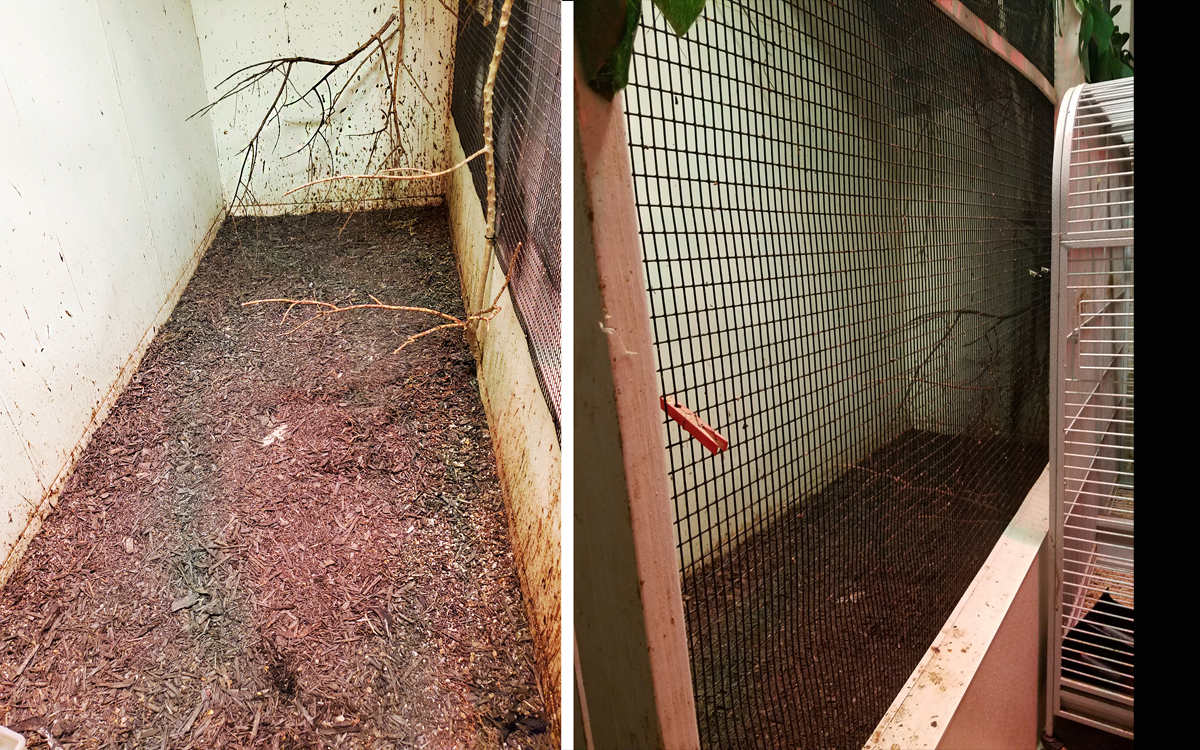 The 4’ wide x 8’ long by 10’ high bat enclosure that housed 60 bats who were severely overcrowded and unable to fly. Sharp twigs were the only cage furniture.[/caption]
[caption id="attachment_12970" align="alignleft" width="1204"]
The 4’ wide x 8’ long by 10’ high bat enclosure that housed 60 bats who were severely overcrowded and unable to fly. Sharp twigs were the only cage furniture.[/caption]
[caption id="attachment_12970" align="alignleft" width="1204"]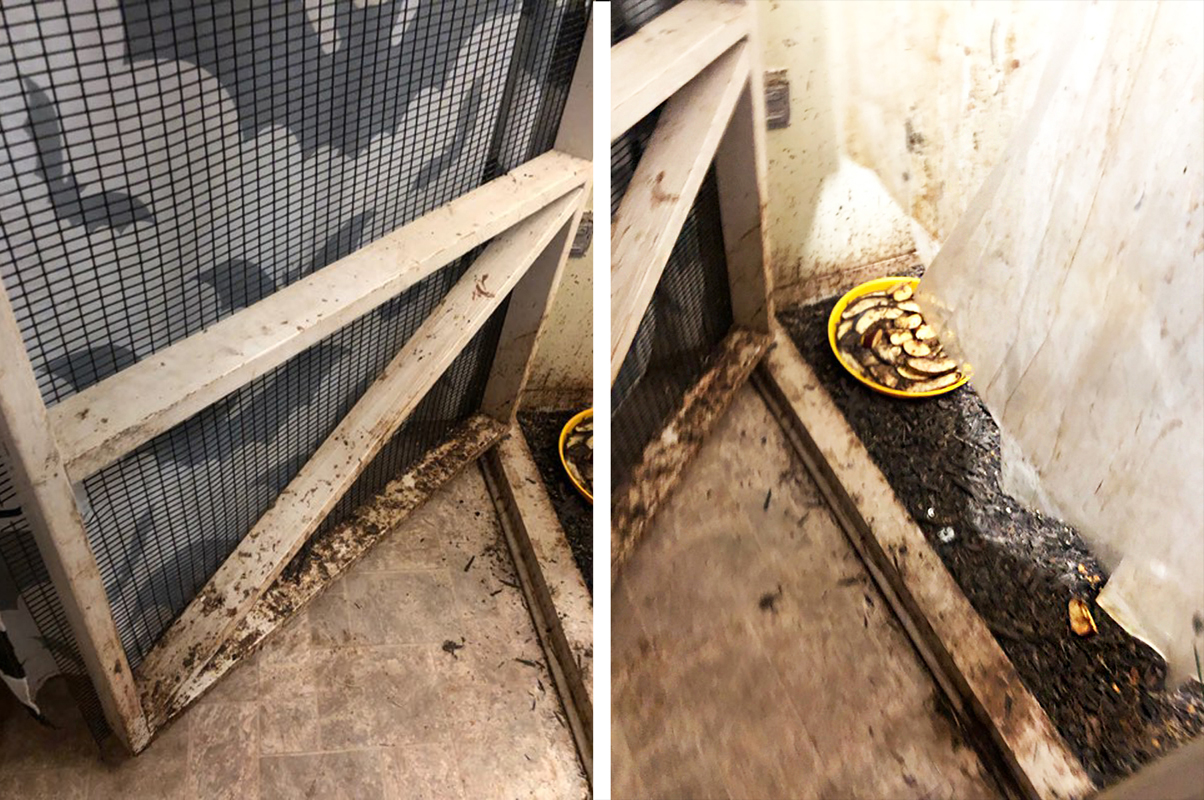 The filthy floor of the bat enclosure showing a dish containing rotten apple slices, contaminated with feces and urine[/caption]
[caption id="attachment_12971" align="alignleft" width="1549"]
The filthy floor of the bat enclosure showing a dish containing rotten apple slices, contaminated with feces and urine[/caption]
[caption id="attachment_12971" align="alignleft" width="1549"]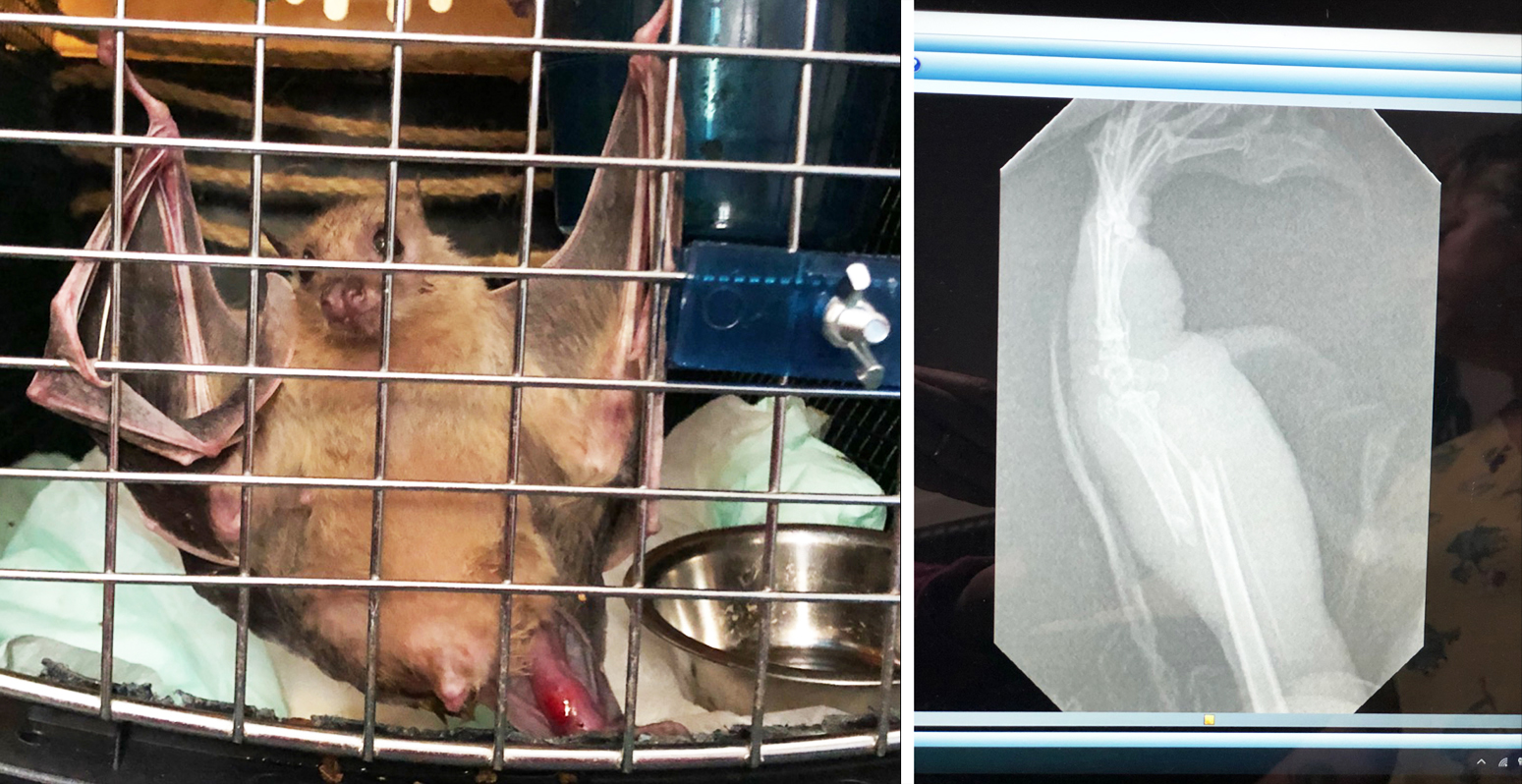 Left" An Egyptian fruit bat with one leg, which is broken and badly infected. The injury is being treated by SCWC in Kentucky. Right:A radiograph showing the severity of the break.[/caption]
[caption id="attachment_12972" align="alignleft" width="1626"]
Left" An Egyptian fruit bat with one leg, which is broken and badly infected. The injury is being treated by SCWC in Kentucky. Right:A radiograph showing the severity of the break.[/caption]
[caption id="attachment_12972" align="alignleft" width="1626"]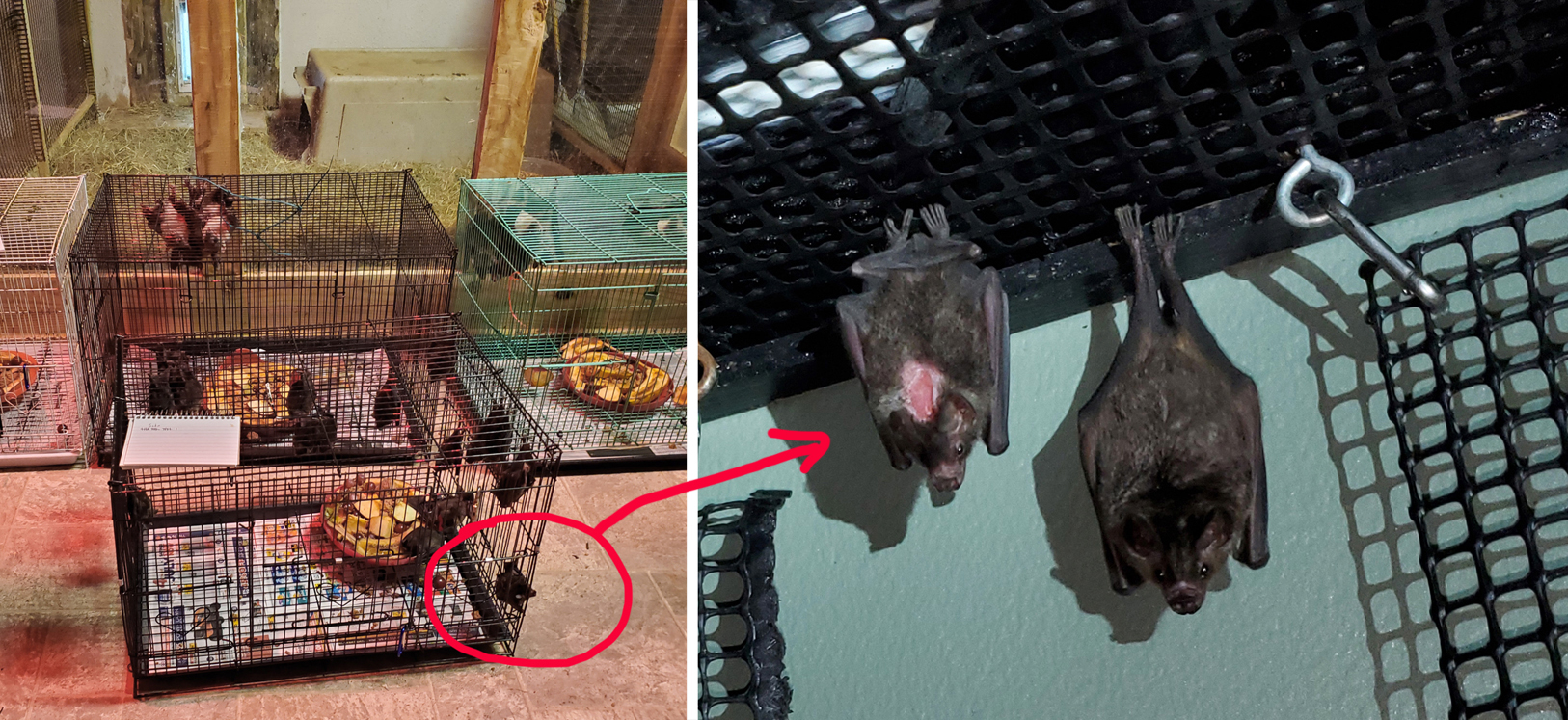 Left: The seba with her head trapped between the cage wire. Apparently she spent the entire night like this. Left: The injury caused to the bat with her head trapped. The skin on her scalp between her ears was peeled back and barely attached to her head but we were able to repair that section. The remaining injury to the back of her neck is currently being treated.[/caption]
[caption id="attachment_12973" align="alignleft" width="1167"]
Left: The seba with her head trapped between the cage wire. Apparently she spent the entire night like this. Left: The injury caused to the bat with her head trapped. The skin on her scalp between her ears was peeled back and barely attached to her head but we were able to repair that section. The remaining injury to the back of her neck is currently being treated.[/caption]
[caption id="attachment_12973" align="alignleft" width="1167"]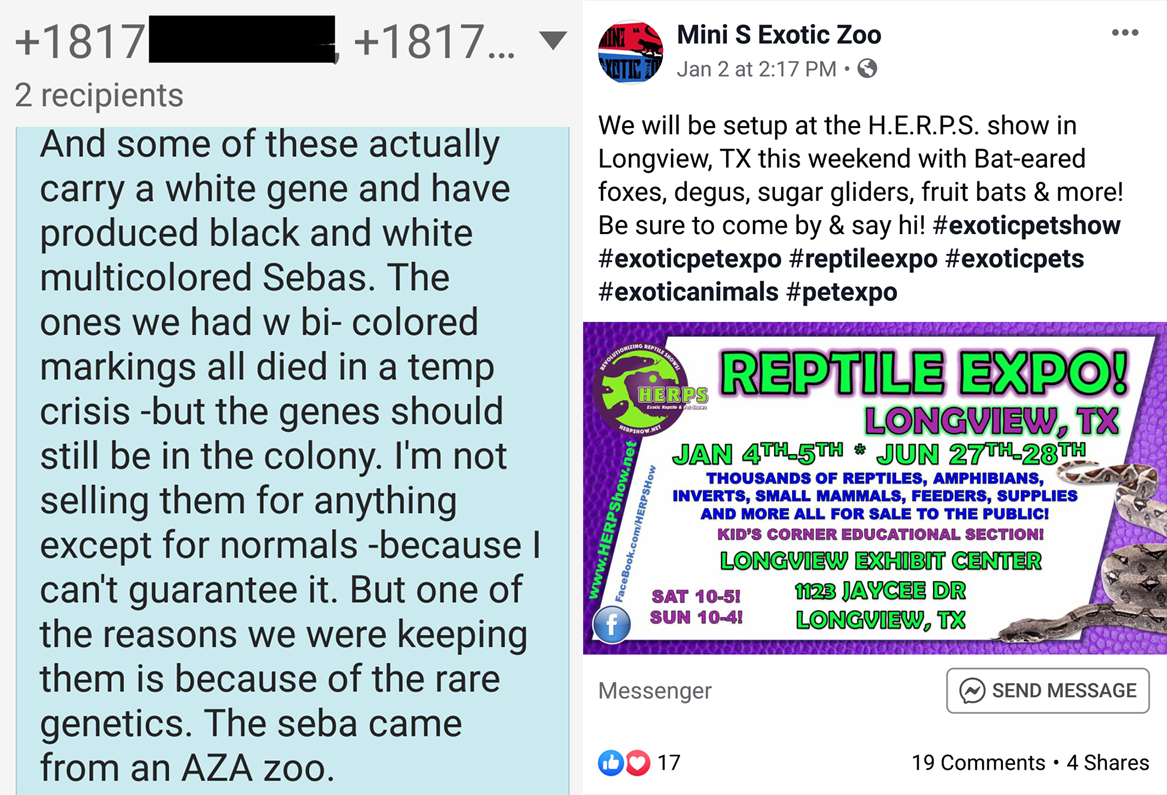 Left: A text from Mini S Exotic Zoo about the supposed worth of the seba bats. Right: An ad posted by Mini S Exotic Zoo on Facebook[/caption]
Left: A text from Mini S Exotic Zoo about the supposed worth of the seba bats. Right: An ad posted by Mini S Exotic Zoo on Facebook[/caption]
We are so appreciative that we were in a position to get these suffering, abused bats to safety and out of harm’s way. The males have been neutered and the mothers are being allowed to raise their babies and keep them for life. Many of the bats are still very frightened so our focus is making sure these beautiful beings understand they will not be going anywhere else; they truly are safe in their forever home with dozens of others just like them. They will be able to fly freely in indoor-outdoor enclosures and eat all of the nourishing food their little bellies can hold. We have been offered two matching grants totaling $15,000 if we can raise that same amount. Please help us help these bats, and all the others still waiting to be rescued by donating here:





